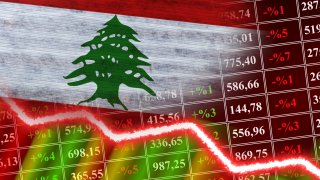Alexander Langlois

The unfortunate narrative that has defined Lebanon for much of its existence is one of corruption and conflict, culminating in the country’s current (and worst) economic and political crisis. France’s May 16 decision to issue an arrest warrant, followed by a similar May 23 German arrest warrant, for the embattled Central Bank Governor Riad Salameh and two associates offers no exception to this dynamic—hitting the small eastern Mediterranean country’s former financial paragon with money laundering and fraud charges just months before he steps down after nearly thirty years at the helm of the Banque Du Liban.
Yet Paris and Berlin’s decision is hardly the end of the road for Salameh or Beirut’s deeply rooted corruption problem. Rather, the move represents an ever-growing skepticism amongst the international community of Lebanon’s elites and its capacity to govern in a technocratic and effective manner.
France and Germany are only two of many other states currently investigating the central bank chief. Switzerland, Liechtenstein, and Luxembourg are also investigating Salameh for similar concerns related to money laundering and fraud. Each case focuses on some or all aspects of roughly $300 million in transfers to European banks from Lebanon via the central bank, which was used to buy various properties and other assets. Investigators and other anti-corruption experts assert the funds likely belong to the Lebanese people. In line with these investigations, France, Germany, and Luxembourg seized assets worth $130 million in early March 2022. Swiss media has reported up to $300 to $500 million in assets embezzled into twelve Swiss banks.
Lebanon is also actively investigating Salameh in spite of strong political resistance from the country’s thoroughly co-opted judicial system. Led for some time by Judge Ghada Aoun—who has become renowned within anti-corruption circles for her brave attempts to hold Lebanon’s banking sector accountable—charged Salameh with illicit enrichment in early 2022. Following a year of back-and-forth questioning and obstruction, the Lebanese judiciary’s disciplinary council removed Aoun from office. She is currently appealing the decision, allowing her to remain in office today.
Salameh continues to deny all charges against him, both in Lebanon and abroad. His brother Raja and a former assistant also deny charges that they aided the governor in efforts to transfer and hide funds in Europe. While all three of these individuals have attended rounds of questioning in Europe and Lebanon with investigators, they have actively delayed the investigation numerous times with the help of Lebanese officials. For example, Lebanon’s Court of Cassation granted Salameh and every central bank employee sweeping legal immunities in September 2022, protecting them from Lebanon’s already poorly enforced banking regulations.
Salameh and associates have also regularly cited health problems or violations of Lebanese sovereignty to avoid hearings and depositions, culminating in his refusal to attend a May 15 hearing or recognize the rights of the investigators that led to the French and German arrest warrants. Rather than cooperate with the Interpol red notice released, however, Lebanese officials instituted a travel ban on Salameh.
Lebanese prime minister Najib Mikati has previously defended the bank chief, recently arguing alongside Salameh that he will complete his term that ends in July, given there is no serious replacement. It should be noted that Mikati and his brother, Taha, have deep ties to Lebanon’s banking system and connections to specific bank transfers facilitated by Raja Salameh between Lebanon and Europe—a point of investigation by the government of Monaco. That said, others in Lebanon—such as Hezbollah leader Hassan Nasrallah—have openly called for his resignation. Critically, Lebanese law makes it illegal to extradite Lebanese citizens.
Thus, Salameh finds himself in a bind but is still largely protected by Lebanon’s ruling class. For figures like Nasrallah, the central bank governor represents low-hanging fruit and is easy to criticize publicly—especially to distract from Hezbollah’s corrupt actions and participation in a government that is increasingly understood to sit at the core of the country’s rot. Other politicians may increasingly concur that Salameh represents an easy target and scapegoat. The question is whether this effectively distracts from the Beirut government’s broader failures inside the country, especially as the international community already understands the country’s elites to be the root cause of Lebanon’s slow collapse.
While unlikely, it would be a mistake for the international community to view Salameh as the sole source of Lebanon’s corruption problem or an easy win to push addressing root issues to the future. While he likely is a key architect of Beirut’s currency exchange Ponzi scheme, his removal from the central bank will not cure the country’s vast corruption problems as he is simply one actor amongst many robbing the Lebanese people. Ultimately, broader political issues—namely banking secrecy, capital controls, and judicial independence reforms—will play a much more transformative role in solving Lebanon’s long-running issues. That being said, accountability measures must be implemented in parallel with such reforms.
For this reason, Salameh can and should be made an example of Lebanon’s near-term future—namely, one that holds corrupt officials to account for crimes that plunder the country at the expense of the average Lebanese citizen. But Salameh cannot be the beginning and end of such efforts. World leaders can support such efforts if they give the Lebanon file a higher priority. This includes supporting the International Monetary Fund’s reform plan through a combination of carrots and sticks that entice Beirut’s leaders and empower the independent opposition. More important, although less realistic anytime soon, should be a broader effort to combat the international kleptocracy that has come to define the neoliberal order and bolstered corrupt actors across the globe.
Alexander Langlois is a foreign policy analyst focused on the Middle East and North Africa. He holds an M.A. in International Affairs from American University’s School of International Service. Follow him at @langloisajl.
No comments:
Post a Comment